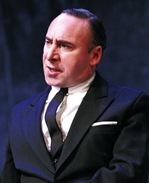SITE GUIDE
SEARCH
REVIEWS
REVIEW ARCHIVES
ADVERTISING AT CURTAINUP
FEATURES
NEWS
Etcetera and
Short Term Listings
LISTINGS
Broadway
Off-Broadway
NYC Restaurants
BOOKS and CDs
OTHER PLACES
Berkshires
London
California
New Jersey
DC
Connecticut
Philadelphia
Elsewhere
QUOTES
TKTS
PLAYWRIGHTS' ALBUMS
LETTERS TO EDITOR
FILM
LINKS
MISCELLANEOUS
Free Updates
Masthead
Writing for Us
A CurtainUp  London Review
London Review
 London Review
London ReviewBroken Glass
|
If you are alive, you are afraid. We are born afraid.
— Dr Hyman
|

Antony Sher as Phillip Gellburg (Photo: John Haynes) |
Dr Hyman (Stanley Townsend) like the Gellburgs, Jewish, is consulted. Sylvia Gellburg is profoundly affected by the news coming out of Germany about the terrible persecution of the German Jews and of Kristallnacht or The Night of the Broken Glass, in particular, from which Miller’s play gets its title. Or so it seems.
Sylvia’s hysterical paralysis in reaction to the harrowing tales from Germany may not be so far from home when we learn that Phillip Gellburg is the only Jew working for an American Bank in the lending department where his job is to foreclose on mortgages. Gellburg claims to be Norwegian, denying his name is Goldberg and seems to repressing his Jewishness. However Dr Hyman also uncovers dysfunction in the physical side of the Gellburgs’ twenty year old marriage and finds himself attracted to the beautiful Sylvia. Although Dr Hyman is not a psychiatrist, he believes that Sylvia’s paralysis may have a psychological cause.
The deep nasal Brooklyn accents are not easy for the British cast but the performances are outstanding. Sher is the tightly controlled husband in denial about his Jewishness and his erectile dysfunction contrasting with Stanley Townsend’s confidant, attractive, womanising and stage commanding American doctor.
Sher’s character is not an endearing one but despite the denials, maybe they are self denials, there is a scene where Sher opens up and is deeply affecting. Tara Fitzgerald as the long suffering wife spends most of the play alone in the large marital bed because of her inability to walk. Caroline Loncq is Margaret, Dr Hyman’s secretary and concerned wife. In between the scenes Laura Moody plays loud and discordant notes on the cello, painful to listen to and reflecting the disharmony in the Gellburgs’ marriage.
Mike Britton’s set has to the side painted walls with the green paint seriously peeling off revealing the bare plaster beneath, symbolic of the surface beneath in this play. This is not one of Miller’s best plays but there are still flashes of his great writing in the wit. The ending is sad but not predictable.
For more about Arthur Miller and links to plays reviewed at Curtainup, see ourMiller Backgrounder
|
Subscribe to our FREE email updates with a note from editor Elyse Sommer about additions to the website -- with main page hot links to the latest features posted at our numerous locations. To subscribe,
E-mail: esommer@curtainup.comesommer@curtainup.com
put SUBSCRIBE CURTAINUP EMAIL UPDATE in the subject line and your full name and email address in the body of the message -- if you can spare a minute, tell us how you came to CurtainUp and from what part of the country. |
| Broken Glass
Written by Arthur Miller Directed by Iqbal Khan Starring: Tara Fitzgertald, Antony Sher, Stanley Townsend With: Caroline Loncq, Suzan Sylvester, Brian Protheroe, Laura Moody Designed by Mike Britton Lighting: Matthew Eagland Composer: Grant Olding Sound: Ed Borgnis Running time: Two hours 30 minutes with one interval Box Office: 0844 482 9675 Booking to 10th December 2011 Reviewed by Lizzie Loveridge based on 19th September 2011 performance at The Vaudeville Theatre, The Strand, London WC2R 0NH (Rail/Tube: Charing Cross) |
|
REVIEW FEEDBACK Highlight one of the responses below and click "copy" or"CTRL+C"
Paste the highlighted text into the subject line (CTRL+ V): Feel free to add detailed comments in the body of the email . . . also the names and emails of any friends to whom you'd like us to forward a copy of this review. |




